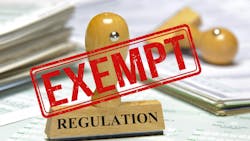Trump Grants Two-Year EPA Chemical Industry Exemption
President Trump has granted a two-year exemption from compliance obligations in section 112 of the hazardous organic NESHAP (HON) rule, according to an American Chemistry Council statement July 18. The NESHAP exemption comes just one year after EPA finalized amendments to air pollution standards for the synthetic organic chemical manufacturing industry and related polymer and resin industries.
The agency prepped industry on its intentions to follow the Trump administration’s lead on deregulation March 12, 2025, when it announced 31 significant actions resulting in the “biggest deregulatory” measure ever. One of those rollbacks included reconsideration of multiple NESHAPs affecting a broad range of U.S. industrial sectors.
NESHAP is short for the National Emission Standards for Hazardous Air Pollutants.
During the March announcement frenzy, EPA Administrator Lee Zeldin noted the Trump administration’s intention for a two-year compliance exemption via Section 112(i)(4) of the Clean Air Act for affected facilities while EPA goes through the rulemaking process.
“EPA is moving forward with the reconsideration of a number of air rules that cover nearly every sector of the American economy. During this review, we will ensure the appropriate protections for human health and the environment based on the best record possible. Breathing clean air, living on clean land, and drinking clean water are all shared goals while we also do our part to usher in a Golden Age of American success,” said Zeldin in a March 12 news release.
Regarding the July 18, 2025, announcement of the two-year exemption, the American Chemistry Council (ACC) issued a statement saying the Trump's action appropriately recognizes the critical role of a strong chemical manufacturing sector to the nation’s overall infrastructure and advanced manufacturing needs across supply chains. ACC also stated that the action will help provide necessary relief from parts of the Biden administration’s rule, which required significant capital expenditures and tight compliance deadlines.
“Without relief from these unworkable timelines, the HON rule jeopardizes the production of essential chemistries that are crucial for our national security interests, including public health and economic security, as they are used for countless everyday products and critical industries such as agriculture, healthcare, semiconductor manufacturing and more," ACC stated in a news release.
In her April Compliance Advisor column for Chemical Processing, which discussed EPA’s March 12 announcements, Lynn L. Bergeson stated: “Disruption on this scale invites vigorous and often unanticipated consequences. It remains to be seen if deregulation on this scale aligns with what the regulated community anticipated and whether it will achieve the intended result.”
About the Author
Traci Purdum
Editor-in-Chief
Traci Purdum, an award-winning business journalist with extensive experience covering manufacturing and management issues, is a graduate of the Kent State University School of Journalism and Mass Communication, Kent, Ohio, and an alumnus of the Wharton Seminar for Business Journalists, Wharton School of Business, University of Pennsylvania, Philadelphia.

